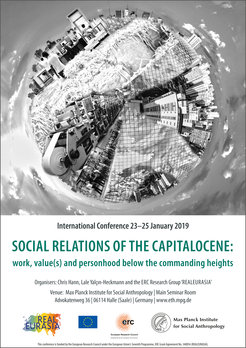Work and Social Relations in the Capitalocene
From 23 to 25 January 2019 a conference with the title “Social Relations of the Capitalocene: Work, Value(s) and Personhood Below the Commanding Heights” will take place at the Max Planck Institute for Social Anthropology. The conference centres around presentations of case studies that look at social relations within enterprises and the value orientation of entrepreneurs worldwide. The conference is organized by Prof. Dr. Chris Hann, Prof. Dr. Lale Yalçın-Heckmann, and the ERC research group REALEURASIA of the Department ‘Resilience and Transformation in Eurasia’ at the MPI. The conference will be held in English.

Global crises and economic action
The beginning of the twenty-first century was marked by numerous global crises that affected nearly every person in the world. The destruction of the environment, the increasing social inequality, the effects of financial capitalism and the global migration waves caused by these developments all have one thing in common: they are the result of human action, not nature. “I would even go a step further and argue that it is not simply human activity in general that is responsible for these crises, but specific economic processes of transformation, in particular capitalist forms of production and the resulting accumulation of capital in the hands of a few,” says Chris Hann, Director of the Department ‘Resilience and Transformation in Eurasia’ at the MPI. US sociologist Jason W. Moore has coined the influential term “Capitalocene” to describe this era marked by social and ecological crisis.
Small businesses still the most common form of employment
Researchers in the project “Realising Eurasia: Civilisation and Moral Economy in the 21st Century”, funded by the European Research Council (Grant agreement n. 340854) and headed by Chris Hann, have investigated the forms of work and value creation that have developed in small and family-run businesses across Eurasia. “Drawing on the empirical data collected during intensive ethnographic field studies in eight countries, we have analysed how and to what degree traditional social relations like kinship, friendship, and commitment to religious values can be reconciled with capitalist mechanisms and logic of action,” says Hann. At the conference “Social Relations of the Capitalocene: Work, Value(s) and Personhood Below the Commanding Heights” the members of the research project will now present the results of four years of work. The study of small businesses is especially relevant because, considered worldwide, most people work in small businesses and not in large international corporations, even if these corporations are omnipresent in the media.
The resilience of social relations in capitalism
“Our studies of small businesses show that social relations are shaped by capitalist logic of production and exchange in numerous and diverse ways. At the same time, they are by no means completely subsumed or dominated by these dynamics. Many social relations have proved to be very resilient and influential,” explains Hann. In order to compare their research results with other data and theoretical approaches, the group has invited numerous internationally renowned researchers who will report on their own projects at the conference.
Studying global social change
The Max Planck Institute for Social Anthropology is one of the world’s leading centres for research in socio-cultural anthropology. It was established in 1999 by Chris Hann and Günther Schlee, and moved to its permanent buildings at Advokatenweg 36 in Halle/Saale in 2001. Marie-Claire Foblets joined the Institute as Director of the Department ‘Law & Anthropology’ in 2012. Common to all research projects at the Max Planck Institute is the comparative analysis of social change; it is primarily in this domain that its researchers contribute to anthropological theory, though many programmes also have applied significance and political topicality. Fieldwork is an essential part of almost all projects. Some 175 researchers from over 30 countries currently work at the Institute. In addition, the Institute also hosts countless guest researchers who join in the scholarly discussions.
Conference programme
Information on the research project
“Realising Eurasia: Civilisation and Moral Economy in the 21st Century”
Contact for this press release
Prof. Dr. Chris Hann
Max Planck Institute for Social Anthropology
Department ‘Resilience and Transformation in Eurasia’
Advokatenweg 36, 06114 Halle (Saale)
Tel.: 0345 2927-200
E-mail: hann@eth.mpg.de
http://www.eth.mpg.de/hann
Prof. Dr. Lale Yalçın-Heckmann
Max Planck Institute for Social Anthropology
Department ‘Resilience and Transformation in Eurasia’
Advokatenweg 36, 06114 Halle (Saale)
Tel.: 0345 2927-221
E-mail: yalcin@eth.mpg.de
http://www.eth.mpg.de/yalcin
PR contact
Stefan Schwendtner
Press and Public Relations
Max Planck Institute for Social Anthropology
Advokatenweg 36, 06114 Halle (Saale)
Tel.: 0345 2927-425
E-mail: schwendtner@eth.mpg.de
